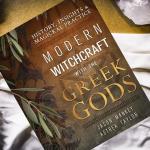In addition to being a Heathen priest (or gythia), I have been an interfaith minister since 2000. I graduated from The New Seminary in New York City, the oldest interfaith seminary in the United States. Since graduation I’ve maintained ties to the school, mentoring students, at one time teaching, and working for the Interfaith Fellowship. Over the years, I’ve noticed several issues involving respect and contention cropping up repeatedly between polytheists like myself and the average interfaith minister. Because of my own background and experiences within the interfaith community, this article discusses some of those issues, focusing on working relationships between interfaith ministers, others committed to interfaith work, and those occasional polytheists with whom they may end up interacting.
When I was in seminary, members of my own very orthodox religion (Heathenry) would often ask if my choosing to study interfaith ministry was indicative of a spiritual crisis on my part. I always found this assumption puzzling for in truth, my studies caused me to look deeper into my own spirituality and brought me closer to the Gods that I love and worship. I graduated more committed to Odin than when I went in! I chose to study to make myself a better priest and minister. I never understood why anyone would assume otherwise. Sadly, over the years, speaking with other interfaith ministers, participating in the alumni list, working as an interfaith celebrant, and doing my own work between religions, I have come to understand the reasons underlying those assumptions; and this understanding has led me to question the true meaning of ‘interfaith.’
As Pagans and Heathens committed to interfaith dialogue, we are charged with the delicate task of exploring and honoring the spirit of numerous religious traditions, many of them often diametrically opposed to each other in major points of theology. This holds all the truer for those readers who are also interfaith ministers. We have the opportunity to create bridges of understanding and respect between faiths. Those bridges can be built even in the midst of drastic differences of opinion and that building starts with us. It starts specifically with the attitude with which we choose to approach not only other faiths, but our own spirituality as well. I have heard many interfaith ministers and ministers-in-training fervently defending their right to add or ‘borrow’ rituals and practices from numerous faiths, meshing these into their own spiritual practice. I have heard avid assertions that “I have the right to add anything I want to my spirituality.” Maybe, but I say this is a slippery road to walk. It is a road lined all too often with a disproportionate sense of entitlement twinned with lack of awareness and sensitivity to what might be seen by many religions as cultural misappropriation and strip-mining. Moreover, all too often there is little respect shown to the Gods and spirits involved.
This is a subject very close to my heart. My religion is one of those that takes great offense to its practices in any way being co-opted by outsiders, no matter how well meaning those outsiders may be. Why this insular clannishness you might ask? The reasons are, for my religion anyway, two fold: firstly, we believe that the Gods are meant to be approached and treated with respect and that They Themselves have shown humanity how they want this done through sacred stories and rituals unique to each culture. Secondly, some religions view themselves not only as spiritual traditions, but as folkways: cultural, linguistic and ethical paradigms without which the spirituality itself is rootless. Someone unwilling to immerse him or herself in that culture and world-view, or at least to see through the eyes of a devotee cannot possibly comprehend the religion in question.
I’ve also noticed over the years that there is a dogged adherence to pantheism in many interfaith circles, which is fine in and of itself. But I have found that this is often used to condescend to polytheists. The religious “norm” is still very much monotheism – whether that is consciously acknowledged or not. Pantheism seems to me to be an attempt to make the idea of multiple Gods and Goddesses “politically correct’ in an interfaith sense – after all, if all Deities are aspects of one Source, then that’s not too big an ideological step from monotheism. Hard polytheism, the view that Gods and Goddesses are distinct and independent entities not only isn’t understood but is seldom approached with respect. Like so much of monotheism, there is all too often an unconscious and well meaning condescension in many interfaith ministers, an attitude of “well, if you were only a little more spiritually evolved, you’d realize that all those Gods and Goddesses are really only emanations of one Being.” That, my friends, is the epitome of disrespect. Furthermore, I maintain that to truly be interfaith, there can’t be a norm. Nothing should be the default religion in an interfaith setting. Instead, there should be areas of commonality, and areas of respectful disagreement with the common goal being mindful service. Somehow, that isn’t what’s happening though. It’s as though people fear disagreement, fear that it will mean they’re not really committed to interfaith work and so instead, strive to banish the intensity of personal commitment to individual religions and individual Gods and Goddesses. What they end up being left with is a watered down pabulum of new age platitudes that serves no one.
The seminary I attended has a motto of “always in addition to, never instead of.” No where in this motto is the dictum that all Gods are interchangeable or that interfaith tolerance should be grounded in a foundation of disrespect for other peoples’ religions. It’s the attitude that we can take whatever we want and change and adapt it without regard to the spiritual and cultural history behind the practice or belief that has folks from Native Americans to modern Reconstructionist Heathens to various Christian groups up in arms. And they have every right to be. They are confronting spiritual and cultural misappropriation at its most arrogant. There is no such thing as fast-food spirituality. I have even heard well meaning interfaith ministers refuse to call members of a religion by the name those members themselves prefer, on the grounds that this minister herself felt some other term was more appropriate. It is an arrogance diametrically opposed to the true spirit of interfaith.
Whenever we approach another religion with a sense of entitlement, with a refusal to open our minds to how the practitioners of that religion approach their spiritual world, with a refusal to set aside our preconceptions and personal preferences we perpetrate a grave a disservice to ourselves and those we wish to touch. We violate the very spirit of interfaith ministry and work. It makes no difference to say that we are following our own truth and harming no one else. By stealing the sacred traditions of another, by showing no respect for the Deities of that tradition as that tradition dictates, we are perpetrating spiritual harm. We are walking in the footsteps of self-absorbed imperialists the world over. Hyperbole? Not to those traditions being strip-mined. No matter how well meaning our intention, if it causes offense to those religions we are exploring then we need to seriously rethink our position and most of all, our actions. We are not entitled to twist another’s spiritual practices to our own needs. Period.
So, what is it that defines the spirit of interfaith? It’s about respect. It’s about respecting and honoring differences while celebrating those rare moments of synchronicity, celebrating the commonalties shared by the various faiths. Religions aren’t resources to be plundered and despite the best of intentions, it is impossible to truly respect a religious tradition while showing no respect for those who follow it. We cannot and should not attempt to take a faith and mold it into what we think it should be. We are charged with meeting each spiritual tradition on its own ground. To do otherwise, is an act of hubris. And hubris, as so many sacred stories show, is not a thing looked fondly upon by the heavens.
Galina Krasskova
Krasskova.weebly.com/blog.html















